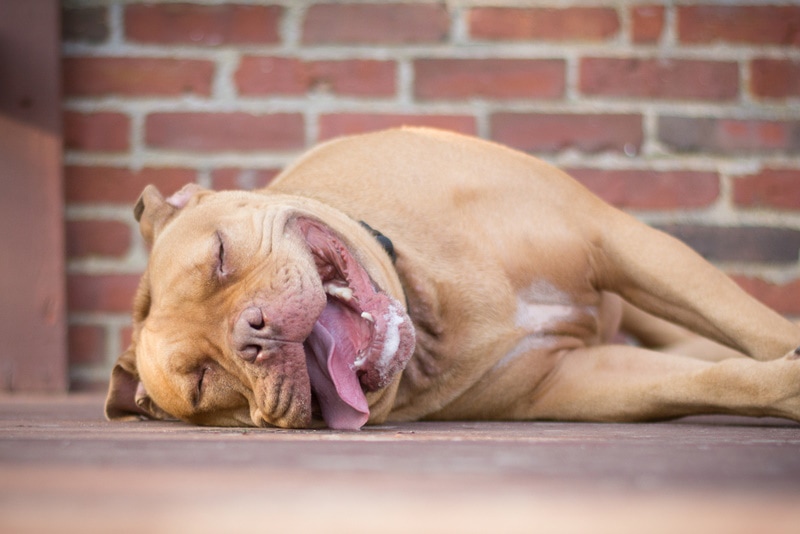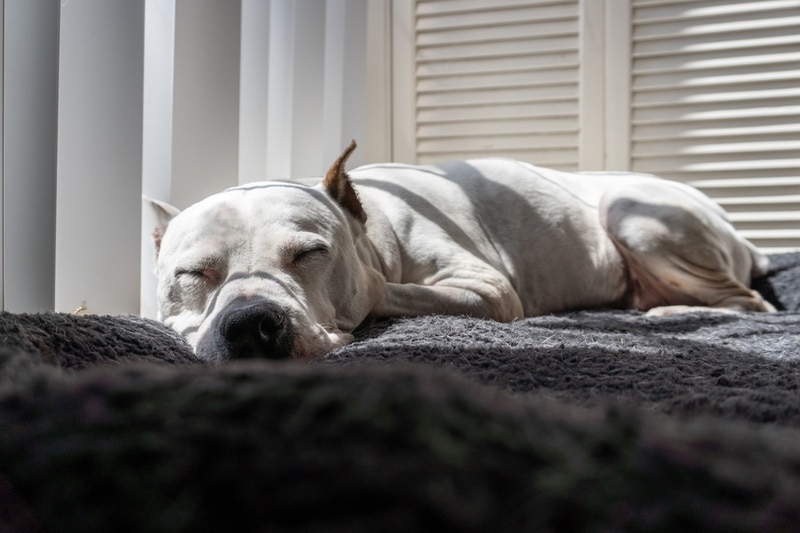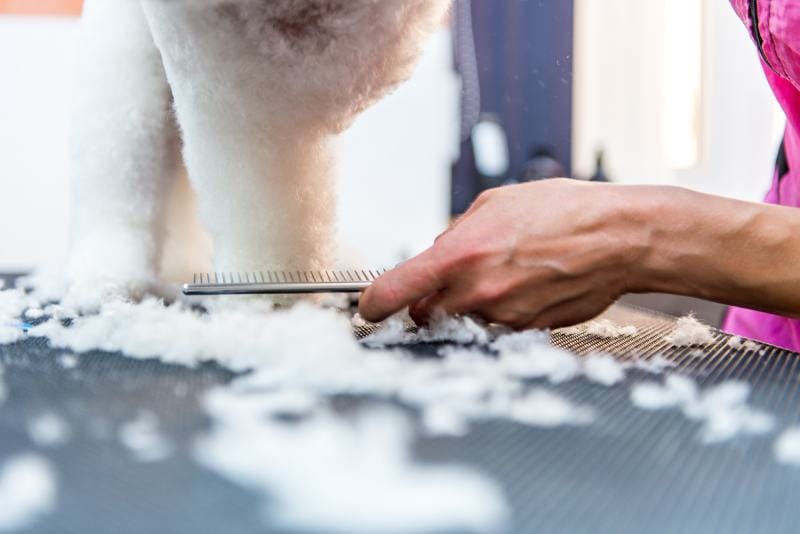Why Do Pitbulls Snore So Much? 8 Vet Approved Reasons
Updated on

As adorable as a dog’s snores may be, it could indicate a health condition that needs veterinary attention. Some dogs, such as Pitbulls, are more prone to snoring because of their anatomy, but you shouldn’t chalk up your Pitties’ snoring as benign until you’ve consulted with your veterinary team. There are many reasons why a Pitbull snores, so it’s best to get your pup checked out to rule out any potential health concerns.
Keep reading to find several reasons why your dog is snoring and to learn when you should take your pet to the vet to have its snoring investigated.
The 8 Reasons Why Pitbulls Snore
Now that you know what snoring is, let’s look at some of the most common causes of snoring in Pitbulls.
1. Narrow Airways
One of the main reasons a Pitbull snores is because of its narrower airways. Excessively floppy tissue may cause throat contractions that then lead to snoring.
A Pitbull’s short muzzle means there’s less room in its mouth for the soft tissues there. Dogs with short noses also have nostrils that can be fully or partially blocked, resulting in a nostril opening that appears crescent-shaped instead of like a tunnel.
2. Obesity
Just as with humans, animals may snore because they’re obese. Overweight dogs may have large fat deposited around their throats, causing their airway to narrow. Since Pitbulls already have a narrow airway, any additional weight they carry can make them more likely to snore.

3. Blockages
Snoring can occur if there are blockages in its airway preventing your dog from breathing as it should. Any obstruction in a dog’s throat, mouth, or nostrils will make it difficult for air to come in and go out as it is supposed to. Obstructions can be caused by foreign materials or build-ups of mucus in the airway.
A dog’s sense of smell is estimated to be between 1,000 to 10,000 times more acute than humans, so they are always actively exploring their environment by smelling it. So, it’s not as rare as you might think for dogs to sniff so wholeheartedly that they sniff something up into their muzzle.
4. Sleeping Position
Certain sleeping positions can cause brachycephalic breeds, like Pitbulls, to snore more than usual. For example, if your pup sleeps on its back, its tongue may be too big for its mouth to accommodate it. This can result in a partial throat blockage that restricts the airway. This can not only make your pup snore but also put it at risk of choking during its sleep.
5. Allergies
If you’re an allergy sufferer, you know how difficult it can be to breathe when exposed to the allergen. Just as with humans, allergies in dogs can cause a host of side effects, like sneezing, congestion, and a runny nose. Congestion and a runny nose may cause nasal passageways to narrow, restricting airflow. This restriction in airflow can cause your pup to open its mouth while sleeping so it can breathe better, causing snoring. Allergens can also inflame your pup’s nasal passageways, causing swelling and limiting airflow.

6. Second-hand Smoke
It’s not rocket science; smokers know that smoking can cause severe and life-threatening effects for themselves. Second-hand smoke is another serious concern for people and animals in the lives of smokers. Smoke can irritate your dog’s nasal passageways, causing snoring. Not to mention, dogs exposed to second-hand smoke are more prone to conditions like eye infections, allergies, and respiratory issues than dogs living with non-smokers.
Ready for a shocking fact? The incidence of nasal tumors is 250% higher in long-nosed dogs living in an environment that’s often smoky. You might think that since Pitbulls don’t have long noses, you’re fine to smoke around your dog. Wrong. Short noses aren’t effective traps, allowing even more inhaled particles and carcinogens from your cigarette habit into your pup’s body. In addition, short-nosed dogs are more prone to develop conditions like lung cancer than their longer-nosed counterparts.
7. Infections
Studies show that brachycephalic dog breeds are more prone to developing respiratory infections. Such infections can cause throat inflammation and mucous build-ups, both of which can cause obstructions in the airway.
8. Sleep Apnea
Dogs with allergies, obesity, or short noses may be more prone to developing sleep apnea. This condition works the same in dogs as in humans; they will temporarily stop breathing during sleep, which causes their bodies to wake them up suddenly. Dogs and humans with sleep apnea will snore excessively, but they’ll also sometimes gasp or choke while asleep, too.
This condition is very serious and demands veterinary attention as soon as possible.
How to Stop a Pitbull From Snoring
Unfortunately, a Pitbull may always be prone to snoring simply due to its anatomy. There is no way you can prevent your pup from snoring entirely because you can’t change how its nasal passageways are built.
That said, there are some things you can do to reduce your pet’s likelihood of snoring.
First, help it maintain a healthy weight. Feed your Pitbull a high-quality diet in the proper portions and ensure it’s getting the right amount of exercise every day.
Next, minimize your dog’s exposure to irritants. If your Pitbull has allergies, work with your vet to determine what it is allergic to and reduce your pet’s exposure to said allergen. This may mean you must do extra work, like washing your dog’s bedding and vacuuming more frequently. Finally, if you smoke, you should consider quitting or, at the very least, not smoking when you’re around your dog.
Observe your dog’s sleeping posture. If you notice it prefers sleeping on its back, a position that will make snoring worse, buy an oval-shaped bed to encourage a curled-up sleeping position instead.

When to Take Your Pitbull to the Vet for Its Snoring
If your Pitbull has always been a bit of a snorer but remains happy, active, and healthy, there likely isn’t much need to be concerned about its snoring habits. Remember, short-nosed breeds like Pitbulls may be naturally more prone to snoring.
If your Pitbull has never snored before and suddenly starts, or if its snoring has gotten worse, it’s a good sign you should look into it further. It could be as simple as a cold, but determining the cause will help you and your vet find the best treatment option.
Final Thoughts
Many factors can cause snoring in Pitbulls. If your dogs’ snoring is new or suddenly worsened, we recommend taking them to the vet for a health check-up. Of course, it could just be your dog’s naturally narrow passageways causing its snoring, but it’s better to err on the side of caution.
Featured Image Credit: Liz Tracy Photography, Shutterstock














